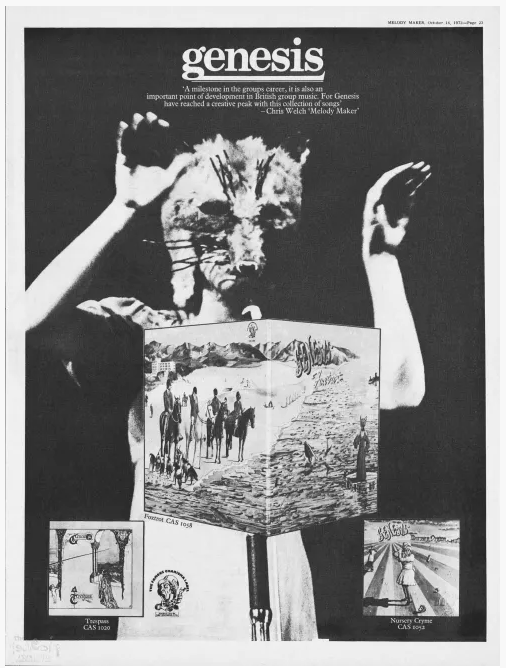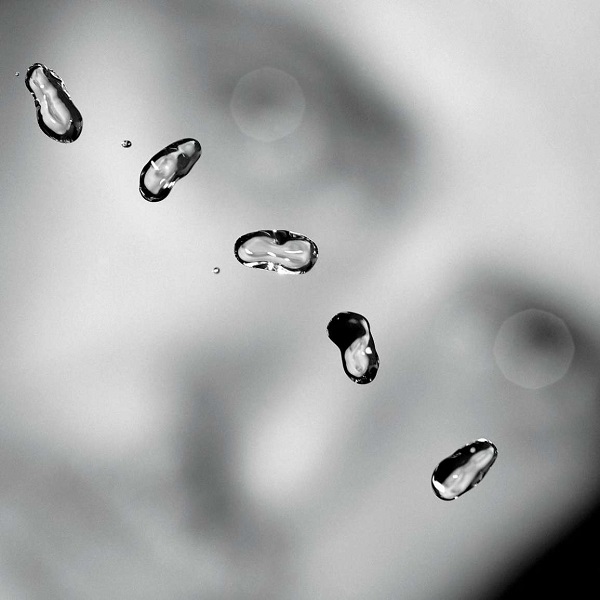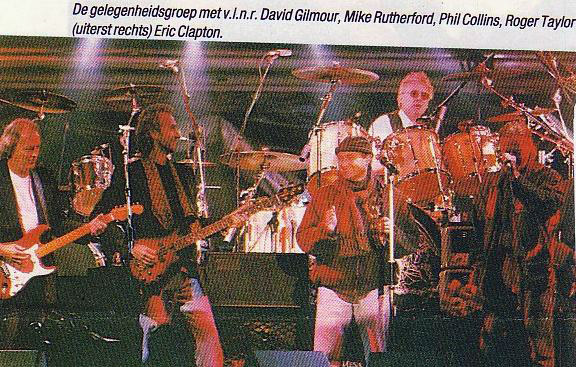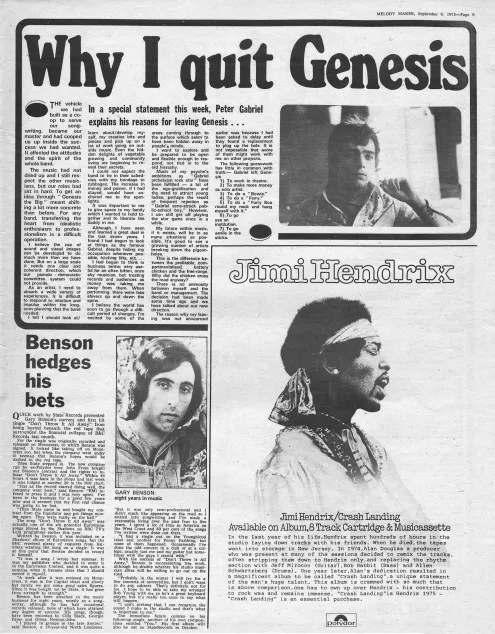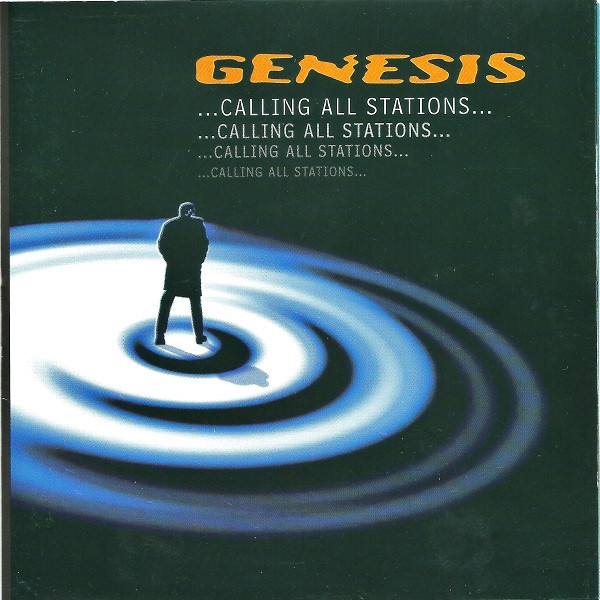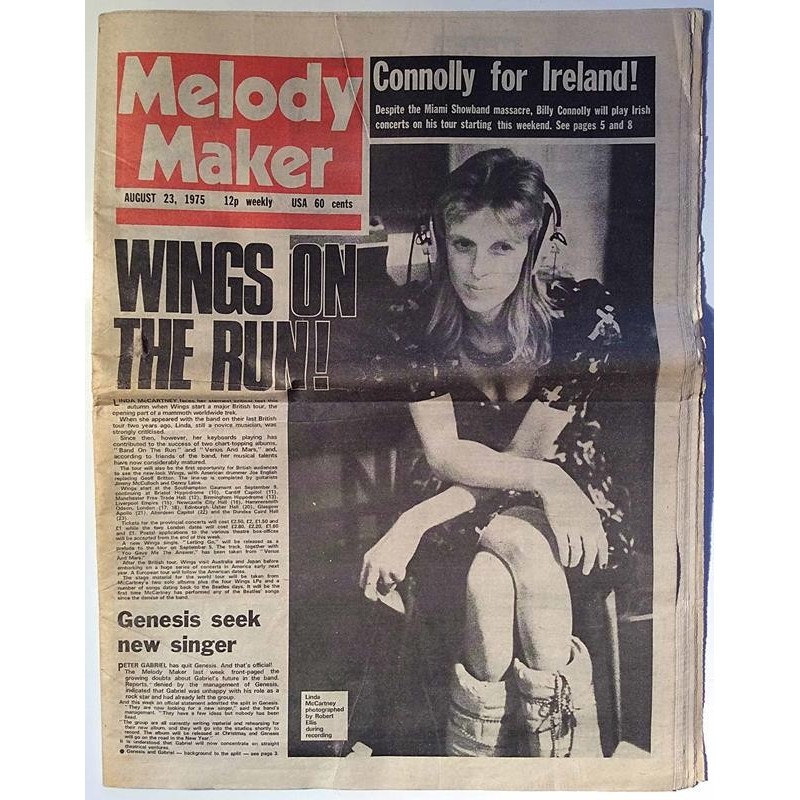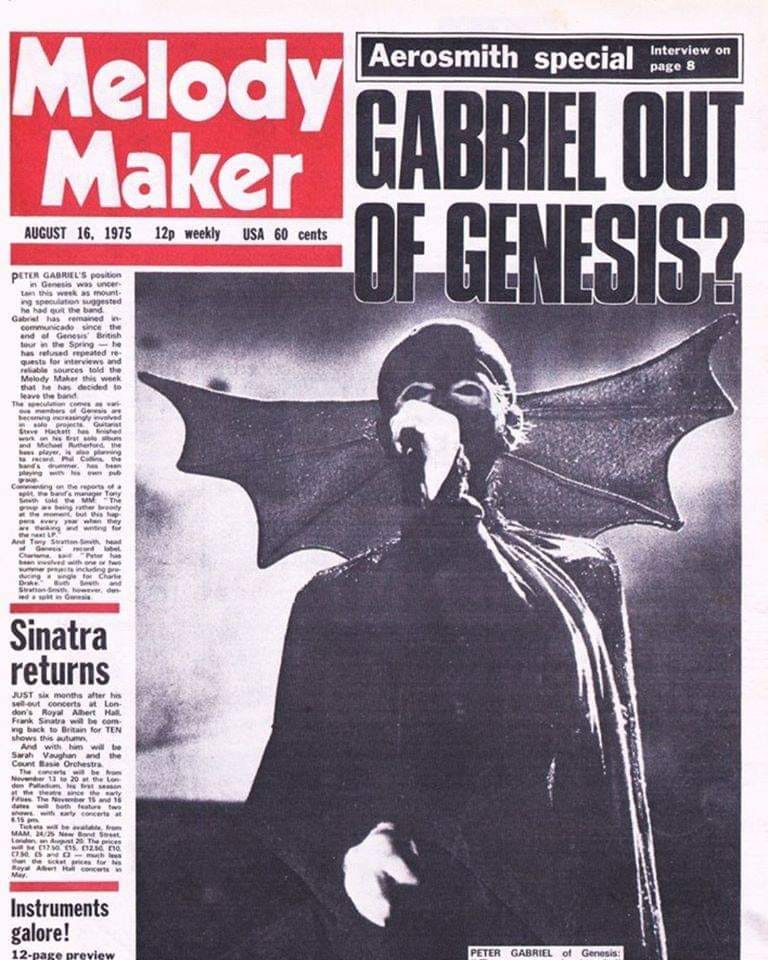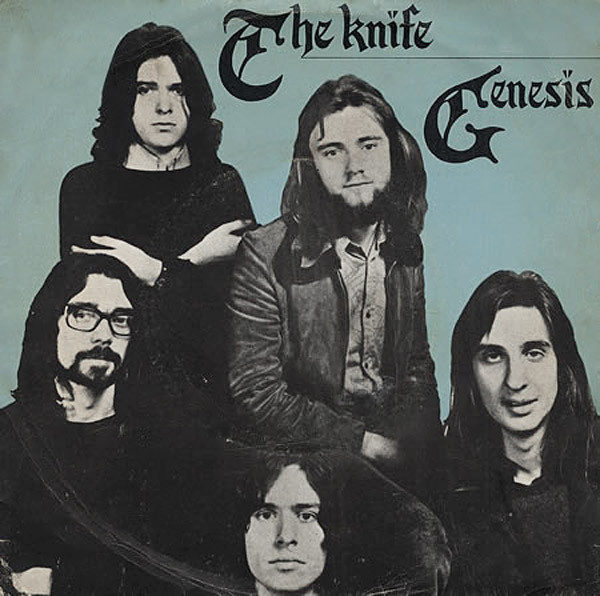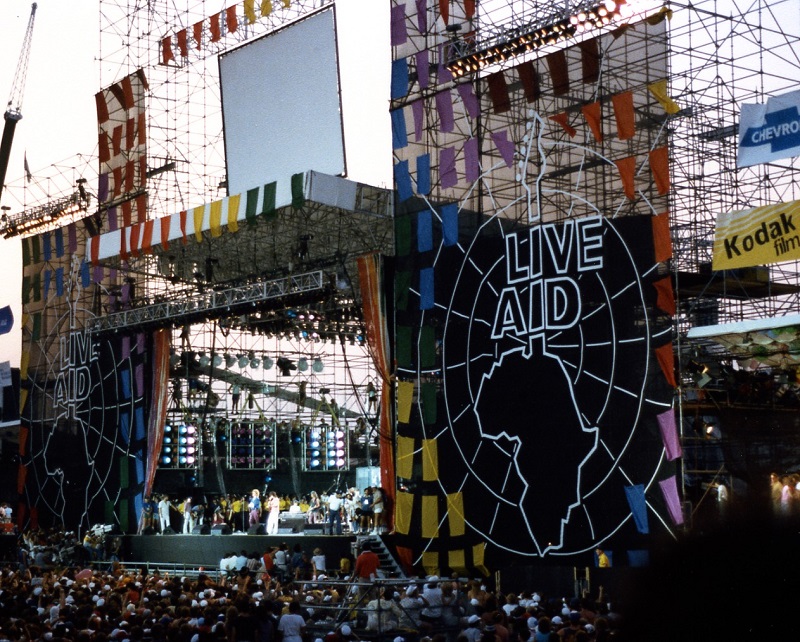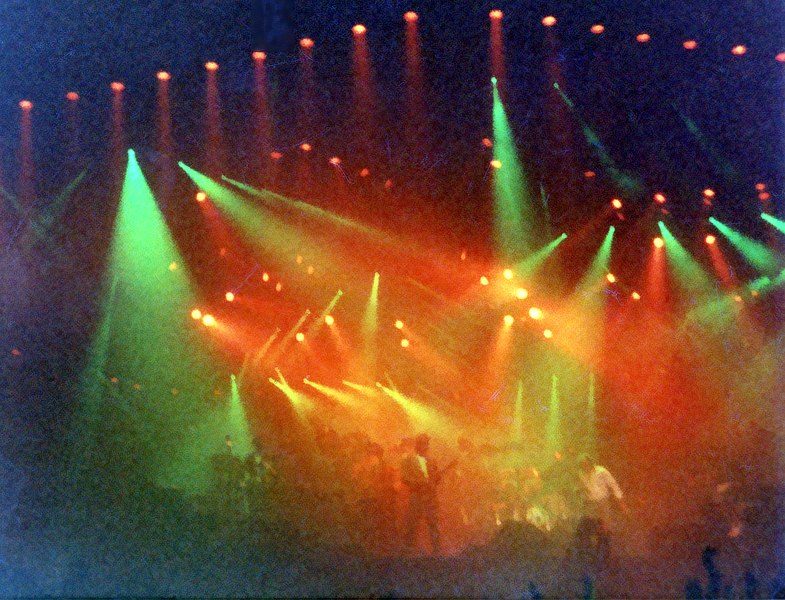On 28 September 1972, Genesis singer Peter Gabriel shocked both his bandmates and the audience in Dublin when he appeared during The Musical Box wearing a fox’s head and a long red dress, the same striking image that would grace the cover of Foxtrot.
Continue reading “Dublin, 28 September 1972: Peter Gabriel steps onstage in a fox head and red dress”Up (2002) – Peter Gabriel
On 23 September 2002, Peter Gabriel’s album Up was released.
Continue reading “Up (2002) – Peter Gabriel”Phil Collins’ Last Gig with Genesis at Cowdray Ruins, 18 September 1993
On 18 September 1993, Genesis gave what would turn out to be Phil Collins’ final live performance with the band: an understated charity concert at the historic Cowdray Ruins in Sussex.
Genesis in 1993
1993 was a relatively quiet year for Genesis. Following their massive We Can’t Dance tour in 1992, the members returned to their solo projects. For Phil Collins, it was a turbulent time. His marriage to his second wife, Jill, was breaking down under heavy tabloid scrutiny, and he poured much of that emotion into his solo album Both Sides. Dark, angry, and intensely personal, the album divided critics, something that weighed heavily on him.
Against this backdrop, Genesis regrouped briefly for a one-off charity concert at Cowdray Ruins. The show raised funds for the King Edward VII Hospice and featured an extraordinary lineup, including Pink Floyd and the surviving members of Queen.
A unique Genesis lineup
That night, Genesis appeared without their regular touring partners Chester Thompson and Daryl Stuermer. Instead, the drums were handled by Roger Taylor (Queen) and Gary Wallis (Mike + The Mechanics), while Tim Renwick (Pink Floyd, Mike + The Mechanics) filled in on guitar and bass.
Genesis performed a short set including “Turn It On Again,” “Hold On My Heart,” “I Can’t Dance,” and a “Tonight, Tonight, Tonight / Invisible Touch” medley. Some sources claim they also played Collins’ solo track “That’s Just the Way It Is,” though this remains doubtful.
Next, Pink Floyd took the stage, with Paul Young (Mike + The Mechanics) providing vocals on some numbers and Mike Rutherford stepping in on bass. Eric Clapton also performed a short set with Mike on bass, before the night ended with the “All Star Cowdray Ruins Band,” featuring nearly everyone involved, running through “Ain’t That Peculiar,” “Can I Get a Witness,” and “Gimme Some Lovin’.”
Low-quality recordings of the event survive on YouTube, but unfortunately no professional release exists, something of a shame, given its historical importance.
Phil’s reflections
Although successful, the concert was modest in scale. Few realized it marked the end of Collins’ 18-year run fronting Genesis. For Phil, the show highlighted his growing distance from the band:
“In the middle of my writing and making BOTH SIDES, Genesis did a concert with Queen. […] But I didn’t enjoy it … As I was singing these songs, it didn’t feel natural. Obviously, it was bad timing, going just like that from doing my most personal thing to a Genesis thing and back. But it definitely felt like ‘What am I doing here?’, like shoes that don’t fit anymore.“1
Though he wouldn’t announce his departure until 1996, the seeds had been sown that evening.
The Cowdray Ruins line-up (as listed in the program):
- Tony Banks – Genesis (keyboards)
- Eric Clapton – guitar
- Phil Collins – Genesis (vocals)
- John Deacon – Queen (bass)
- David Gilmour – Pink Floyd (guitar)
- Adrian Lee – Mike + The Mechanics (keyboards)
- Nick Mason – Pink Floyd (drums)
- Tim Renwick – Mike + The Mechanics / Pink Floyd (bass, guitar)
- Mike Rutherford – Genesis (guitar, bass)
- Roger Taylor – Queen (vocals, drums)
- Garry Wallis – drums
- Richard Wright – Pink Floyd (keyboards)
- Paul Young – Mike + The Mechanics (vocals)
Phil’s departure was still a few years away from being official. But looking back, Cowdray Ruins was the true closing chapter of his time with Genesis.
Sources
Hewitt, Alan (2000): Opening The Musical Box. London: Firefly Publishing.
Platts, Robin (2007): Genesis. Behind the lines, 1967-2007. Burlington, Ont., Canada: Collectors Guide Pub.
Thompson, Dave (2005): Turn it on again. Peter Gabriel, Phil Collins & Genesis. San Francisco: Backbeat Books.
- in Platts 2007: 140 ↩︎
Peter Gabriel: ‘Why I Quit Genesis’ – Melody Maker 6 September 1975
Peter Gabriel’s press announcement about why he has quit Genesis, published in The Melody Maker on 6 September 1975.
Peter Gabriel writes why he left Genesis
The news of Peter Gabriel’s departure from Genesis had first leaked in various music magazines from July 1975 onwards. At first, Genesis’ label Charisma Records denied the rumours, but in August finally admitted that Peter had left. On 6 September 1975, Peter Gabriel issued his own press statement, insisting that they should publish it only in full.
Peter Gabriel’s statement:
I had a dream, eye’s dream. Then I had another dream with the body and soul of a rock star. When it didn’t feel good I packed it in. Looking back for the musical and non-musical reasons, this is what I came up with:
OUT, ANGELS OUT – an investigation.
The vehicle we had built as a co-op to serve our songwriting became our master and had cooped us up inside the success we had wanted. It affected the attitudes and the spirit of the whole band. The music had not dried up and I still respect the other musicians, but our roles had set in hard. To get an idea through “Genesis the Big” meant shifting a lot more concrete than before. For any band, transferring the heart from idealistic enthusiasm to professionalism is a difficult operation.
I believe the use of sound and visual images can be developed to do much more than we have done. But on a large scale it needs one clear and coherent direction, which our pseudo-democratic committee system could not provide.
As an artist, I need to absorb a wide variety of experiences. It is difficult to respond to intuition and impulse within the long-term planning that the band needed. I felt I should look at/learn about/develop myself, my creative bits and pieces and pick up on a lot of work going on outside music. Even the hidden delights of vegetable growing and community living are beginning to reveal their secrets. I could not expect the band to tie in their schedules with my bondage to cabbages. The increase in money and power, if I had stayed, would have anchored me to the spotlights. It was important to me to give space to my family, which I wanted to hold together, and to liberate the daddy in me.
Although I have seen and learnt a great deal in the last seven years, I found I had begun to look at things as the famous Gabriel, despite hiding my occupation whenever possible, hitching lifts, etc. I had begun to think in business terms; very useful for an often bitten once shy musician, but treating records and audiences as money was taking me away from them. When performing, there were less shivers up and down the spine.
I believe the world has soon to go through a difficult period of changes. I’m excited by some of the areas coming through to the surface which seem to have been hidden away in people’s minds. I want to explore and be prepared to be open and flexible enough to respond, not tied in to the old hierarchy.
Much of my psyche’s ambitions as “Gabriel archetypal rock star” have been fulfilled – a lot of the ego-gratification and the need to attract young ladies, perhaps the result of frequent rejection as “Gabriel acne-struck public school boy”. However, I can still get off playing the star game once in a while.
My future within music, if it exists, will be in as many situations as possible. It’s good to see a growing number of artists breaking down the pigeonholes. This is the difference between the profitable, compartmentalized, battery chicken and the free-range. Why did the chicken cross the road anyway?
There is no animosity between myself and the band or management. The decision had been made some time ago and we have talked about our new direction. The reason why my leaving was not announced earlier was because I had been asked to delay until they had found a replacement to plug up the hole. It is not impossible that some of them might work with me on other projects.
The following guesswork has little in common with truth:
Gabriel left Genesis
1) To work in theatre.
2) To make more money as a solo artist.
3) To do a “Bowie”.
4) To do a “Ferry”.
5) To do a “Furry Boa round my neck and hang myself with it”.
6) To go see an institution.
7) To go senile in the sticks.
I did not express myself adequately in interviews and I felt I owed it to the people who have put a lot of love and energy supporting the band to give an accurate picture of my reasons. So I ask that you print all or none of this.1
Title photo: Melody Maker 6 September 1975: Peter Gabriel: Why I Quit Genesis
Sources
Bright, Spencer (1988): Peter Gabriel. An authorized biography. London: Sidgwick & Jackson.
Holm-Hudson, Kevin (2008): Genesis and the lamb lies down on Broadway. Aldershot, England, Burlington, VT: Ashgate
Platts, Robin (2007): Genesis. Behind the lines, 1967-2007. Burlington, Ont., Canada: Collectors Guide Pub.
- The statement can be found in Bright (1988: pp. 65-66), Platts (2007: pp. 80-81) and Holm-Hudson (2008: pp. 113-114), ↩︎
Calling All Stations (1997) – Genesis
After Phil Collins’ departure from Genesis in 1996, the remaining two members Tony Banks and Mike Rutherford kept writing music and hired a new singer: Ray Wilson, born in 1968, known as lead vocalist of the band Stiltskin.
Continue reading “Calling All Stations (1997) – Genesis”‘Peter Gabriel Quits Genesis’ – Melody Maker 23th August 1975
A week after The Melody Maker had rumoured about Peter Gabriel’s decision to leave Genesis, the departure was confirmed with the cover story ‘Genesis Seek New Singer’.
Chris Welch recalls a great British Band
At this point, the band had already moved on and worked on what became their next album A Trick of The Tail. Peter Gabriel’s departure was old news for them, but now, they had to deal with the media. For them, Genesis could not exist without Gabriel and his visuals. In the eyes of the critics, he was the band, not just a member of the team. Naturally, the band felt upset by the obtiuary. In The Melody Maker, journalist Chris Welch ‘recalls a great British Band’.
The front page of Melody Maker from 23 August 1975
Several news papers reported about Peter Gabriel’s departure on 23 August 1975. The front page of Melody Maker said:
Genesis seek new singer
PETER GABRIEL has quit Genesis. And that’s official!
The Melody Maker last week front-paged the growing doubts about Gabriel’s future in the band. Reports, denied by the management of Genesis, indicated that Gabriel was unhappy with his role as a rock star and had already left the group.
And this week an official statement admitted the split in Genesis. “They are now looking for a new singer,” said the band’s management. “They have a few ideas but nobody has been fixed.”
“The group are currently writing material and rehearsing for their new album, and they will go into the studio shortly to record. The album will be released at Christmas and Genesis will go on the road in the New Year.”
It is understood that Gabriel will now concentrate on straight theatrical ventures.
Of course, the band was interviewed by the press after the news had come out. Phil Collins remarked that the rest of the band ‘…were not stunned by Peter’s departure because we had known about it for quite a while.’1 They had already decided to carry on without him and interestingly, the new singer was already in the group and was exactly the same member who had exclaimed the statement from the Melody Maker‘s article above. But that’s another story.
Title photo: Front page of Melody Maker 23 August 1975
- Welch, Chris. “Peter Gabriel Quits Genesis”. Melody Maker, 23 August 1975. ↩︎
‘Gabriel Out Of Genesis?’ – Melody Maker 16th August 1975
The Melody Maker rumoured in its edition of 16 August 1975 about Peter Gabriel’s departure from Genesis.
Peter Gabriel left the band after the 1975 tour
After the The Lamb Lies Down On Broadway tour in 1975, lead singer Peter Gabriel left Genesis. The band did not announce his departure right away, but instead went into the studio to record what became their next album A Trick of The Tail and audition new singers. By August 1975, the press had heard rumours about Peter Gabriel’s decision to leave Genesis. On 16 August, the Melody Maker put a picture with him wearing the batwings on the cover and featured the headline GABRIEL OUT OF GENESIS?
Here’s the text from the Melody Maker’s front page:
GABRIEL OUT OF GENESIS?
PETER GABRIEL’S position in Genesis was uncertain this week as mounting speculation suggested he had quit the band.
Gabriel had remained incommunicado since the end of Genesis’ British tour in the Spring – he has refused repeated requests for interviews and reliable sources told the Melody Maker this week that he has decided to leave the band.
The speculation comes as various members of Genesis are becoming increasingly involved in solo projects. Guitarist Steve Hackett has finished work on his first solo album and Michael Rutherford, the bass player, is also planning to record. Phil Collins, the band’s drummer, has been playing with his own pub group.
Commenting on the reports of a split, the band’s manager Tony Smith told the MM: “The group are being rather broody at the moment, but this happens every year when they are thinking and writing for the next LP.“
And Tony Stratton-Smith, head of Genesis’ record label, Charisma, said: “Peter has been involved with one or two summer projects including producing a single for Charlie Drake.” Both Smith and Stratton-Smith, however, denied a split in Genesis.
Genesis manager Tony Smith first denied the rumours, but a week later, the band announced it officially and explained that they were searching for a new singer. Hardly did they know that the singer was already in the group: Their drummer Phil Collins. But that’s another story.
Title photo: Melody Maker 16 August 1975: Gabriel out of Genesis?
How Phil Collins Joined Genesis
On 4 August 1970, Phil Collins officially became the drummer for Genesis. Here’s the story of how he landed the gig, and how it all began with a swim.
‘Looking for someone…’
By the summer of 1970, Genesis had just suffered what they later described as the biggest loss in their career: guitarist and founding member Anthony Phillips had decided to leave the band. Though the music on Trespass was complete, Ant’s struggle with stage fright made it impossible for him to continue performing. With his departure, Genesis (then a quartet) decided it was time to look for a new guitarist and, crucially, a new drummer.
Up until that point, they had gone through three different drummers. So, they placed an anonymous ad in Melody Maker, the go-to magazine for musicians in the UK:
‘TONY STRATTON SMITH is looking for 12-STRING GUITARIST who can also play lead; plus DRUMMER sensitive to acoustic music.’
One aspiring young drummer in London happened to see it: Phil Collins.
Answering the call
Phil had previously played in a band called Flaming Youth (originally named Hickory) and released one album with them. But the band never took off, rarely performed live, and left Phil frustrated and eager for something new. Determined to pursue a career as a professional drummer, he began scanning Melody Maker for new opportunities.
He recognised the name of the band’s manager, Tony Stratton-Smith, from his earlier music ventures and knew he could often be found at the bar in London’s Marquee Club. So Phil turned up and asked directly if he could audition for the band. Stratton-Smith responded that the band insisted on auditions for everyone. The band, he revealed, was Genesis. Phil had seen their name in the back pages of Melody Maker listings, but didn’t know much about their music.
At the time, Genesis was a trio: Tony Banks on keyboards, Peter Gabriel on vocals, and Mike Rutherford on guitar and bass. Phil recalls calling them and speaking with Peter Gabriel:
‘He said ‘Yes, uhm, come down to my parents’ house in Chobham.”
Peter was intrigued when Phil mentioned he had played with George Harrison. (Phil would later admit that all he had done was play percussion on one of George’s sessions, but the name-drop got his foot in the door.)
The audition (and the swimming pool)
Phil and his friend, guitarist Ronnie Caryl, drove out to the Gabriels’ countryside home near Woking on a hot summer day. The house had a pool and was surrounded by fields. Ronnie was hoping to join the band too.
Phil remembers seeing Mike Rutherford in what looked like a crushed velvet dressing gown and slippers. (Mike insists it was just a swimsuit and robe – they were by the pool, after all.) Tony Banks barely spoke and struck Phil as a ‘tortured artist.’ Peter Gabriel seemed eccentric.
They’d arrived early, and there were still a few drummers ahead of Phil. While waiting, they were invited to take a swim.
‘Being there early and having two or three drummers ahead of me, I didn’t know what the conversation was, what they were saying to each other, but I could hear the music. The same piece of music being played two or three times and the same piece of music being played with the next guy two or three times. So by the time I came up to play, I kind of felt I knew what I was doing.’
The band played pieces that showed the different styles Genesis was experimenting with: delicate passages, heavier sections, and more experimental parts. Phil listened to the Trespass album in the living room and was struck by the harmonies that reminded him of Crosby, Stills & Nash. He later said he would’ve joined them even if he hadn’t liked the music: he simply needed a job.
Thanks to the sneak preview while in the pool, Phil nailed the audition.
Peter Gabriel later said:
‘Just the way he sat down on the stool, I knew he was going to be good. Some people have this sort of confidence about what they do.’
After they left, Ronnie thought Phil had failed the audition but that he had done great. As we know, it turned out the other way around. Phil got the job. Ronnie didn’t, but he did end up playing in Phil’s solo band years later.
Fitting into the band
Phil, then just 19, joined Genesis in August 1970. The band took a short holiday before getting back together to rehearse in a space called Farnham Maltings, which Mike’s father helped them rent. Over six weeks, they began working on what would become Nursery Cryme.
Phil immediately noticed the cultural gap between him and the others. He was a working-class lad with a grammar and stage school background. The others were Charterhouse-educated public school boys. He recalls seeing Tony Banks and thinking he looked like Beethoven with his long hair.
Peter Gabriel, meanwhile, had a bass drum next to his mic stand, which he would bang on spontaneously, even out of rhythm. This annoyed Phil.
The atmosphere in the band was intense. Tensions ran high, especially between Peter and Tony.
‘In the middle of a conversation, suddenly someone would get up and slam a guitar on the floor and walk out‘, Phil remembers. ‘I thought ‘What?’ Someone had said something to upset somebody else. Two hours later this person would come back and we’d start playing again. Suddenly there’d be ‘Oh, f*** you’ and somebody else walked out. It was very highly strung.’
Peter Gabriel adds:
‘I would often be at loggerheads with Tony Banks, and Phil would always sit on the fence, he would never want to come into the argument.’
Phil’s different background influenced more than just the sound. It affected the group’s dynamics. He realised early on that his role included defusing arguments with humour, a skill that came naturally from his time at stage school.
Mike Rutherford recalls:
‘Apart from the humour, he’s got a very laid-back approach. He was very serious about his work, but had a very laid-back approach to life, which I think helped us a little bit.‘
Phil may have thought he was joining a band that held rehearsals by a pool in the countryside. In reality, he’d just signed up for years of rough touring in a van. But the chemistry was right and the rest is history.
Title photo: Genesis – ‘The Knife’ (single cover).
Sources
Phil Collins – A Life Less Ordinary (documentary, 2002)
Genesis – Sum of the Parts (documentary, 2014)
Philipp Röttgers – Two eras of Genesis? The development of a rock band (book, 2015)
Live Aid, July 13, 1985: Phil Collins Performs in Both London and Philadelphia
On July 13, 1985, Phil Collins made music history by doing something no one had ever done before (and likely hasn’t done since). He was the only performer to appear live at both Live Aid concerts, in London and Philadelphia, on the very same day.
Phil Collins: Everywhere at Once
By the mid-1980s, Phil Collins had become a global phenomenon. As both a solo artist and member of Genesis, he had racked up chart-topping albums, hit singles, and sold-out tours across the world. His third solo album, No Jacket Required, had taken 1985 by storm, dominating airwaves and topping the charts in multiple countries.
So it was only fitting that on July 13, 1985, a day described as “the greatest day in the history of pop music”, Phil Collins would also be everywhere — quite literally.
Making Rock History
Collins pulled off what seemed impossible: he performed live on global television from two different continents in a single day. And it was not for fame or headlines, it was for a cause. Live Aid, organized by Bob Geldof, aimed to raise funds for famine relief in Ethiopia. Like the Band Aid single “Do They Know It’s Christmas?” the year before, the event brought together some of the biggest names in music for one shared purpose.
While many artists participated, the day belonged to Phil Collins.
Live Aid: The Event
Live Aid was the natural successor to Band Aid. Geldof had rallied the stars once again, this time for two simultaneous mega-concerts, one at Wembley Stadium in London, the other at John F. Kennedy Stadium in Philadelphia. Almost every major pop and rock act of the 1980s took part.
Collins had previously played drums on the Band Aid single, but didn’t sing on it. His record label had advised him to hold off singing publicly, so as not to distract from the release of No Jacket Required and its upcoming tour. That changed with Live Aid.
July 13: A Day to Remember
Collins began his day at Wembley Stadium in London. In the early afternoon, under a blazing sun, he sat alone at the piano and performed “Against All Odds” and “In the Air Tonight”.
‘lt was blisteringly hot, the white stage. lt was so hot and l made a terrible mistake on ‘Against All Odds’ on the piano’, Phil later recalled. ‘l thought, ‘Oh God, what a good start for the day this is.”1
The bum note was heard not only by the 80,000 people at Wembley, but by over 1 billion viewers watching around the world.
He was then joined by his friend Sting for a duet of “Long Long Way to Go”, a track from No Jacket Required (Sting had sung backing vocals on the original), followed by a performance of “Every Breath You Take”.
From London to Philadelphia
Collins left Wembley, jumped on a Concorde, and flew across the Atlantic to perform at the Philadelphia show just a few hours later. He recreated his solo set and also played drums for both Eric Clapton and the reunited Led Zeppelin.
He arrived at JFK Stadium at around 7:00 p.m., asked Eric Clapton what they’d be playing, and by 7:30 p.m., he was onstage with him. Somewhere in between, he even found time to visit Robert Plant’s trailer for a quick chat before their Led Zeppelin set.
It was a whirlwind. But it perfectly captured the tireless energy of Phil Collins in the 1980s.
The Legacy
By 1985, Collins was already a global star. But performing at both Live Aid concerts catapulted him even further, cementing his status as a worldwide icon and consummate showman. His double appearance was not only a technical and logistical feat, but a powerful symbol of the unity and urgency behind Live Aid’s mission.
Live Aid: In Hindsight
While Live Aid is remembered for its good intentions, it’s also seen — in retrospect — as a bit of a cliché: wealthy Western musicians trying to “save” Africa with rock music. The lyrics of Do They Know It’s Christmas? have been criticized for their colonial tone and stereotypes. Still, the event did raise enormous funds and global awareness for the crisis in Ethiopia.
Phil Collins didn’t just participate in the day, he helped define the moment. His double appearance remains one of the most talked-about achievements of Live Aid, and one of the most iconic performances in rock history.
Title photo: Live Aid at JFK Stadium, Philadelphia, PA. Source: Wikimedia Commons, own work. Author: Squelle. / CC-BY-SA-2.5 (https://creativecommons.org/licenses/by/3.0).
- Phil Collins – A Life Less Ordinary (Documentary – 2002) ↩︎
The End of the Invisible Touch Tour – Wembley, July 4, 1987
On July 4, 1987, Genesis wrapped up their massive Invisible Touch tour with the fourth consecutive sold-out show at Wembley Stadium. It marked the end of a historic run for the band and a high point in their live career.
Invisible Touch: The Album
Released in 1986, Invisible Touch became Genesis’ most commercially successful album, reaching #1 in the UK and #3 in the US. It produced five major hit singles: ‘Invisible Touch’, ‘Tonight Tonight Tonight’, ‘Land of Confusion’, ‘In Too Deep’ and ‘Throwing It All Away’. Tracks like the title song, the moody Tonight, Tonight, Tonight, and Land of Confusion with its iconic Spitting Image video dominated radio, MTV, and the charts throughout 1986 and 1987. Genesis had never been more visible – or more popular.
Naturally, the band embarked on a massive world tour, playing across North America, Australia, Japan, Europe, and finally closing with four sold-out nights at Wembley, playing to nearly 300,000 people.
The Invisible Touch Tour
The tour kicked off in September 1986 in the US and included 112 shows, selling close to two million tickets. The band was joined, as usual, by drummer Chester Thompson and guitarist/bassist Daryl Stuermer.
In Australia and New Zealand, Genesis added a local four-piece string section for In Too Deep and Your Own Special Way, due to union regulations requiring them to employ local musicians.
By this point, Genesis weren’t just a hit-making machine, they were a finely-tuned live band, backed by a state-of-the-art Vari-Lite lighting system and a tight, polished setlist. While they had a vast catalogue to choose from, the shows leaned heavily on songs from Invisible Touch and recent albums.
The Setlist and Show Highlights
Every show opened with Mama, though its eerie atmosphere did not always translate well in daylight stadium settings. The closer was the now-iconic Turn It On Again medley, which featured a whirlwind of rock classics: Everybody Needs Somebody to Love, Satisfaction, Twist and Shout, Pinball Wizard, All Day and All of the Night and Karma Chameleon.
Older fan favorites included: Los Endos, Home By The Sea (with its now-standard ghost-story intro) and the In The Cage medley.
At the beginning of the tour, the In the Cage medley included In That Quiet Earth and the second half of Supper’s Ready. But as the tour progressed, Phil Collins began having trouble hitting some of the higher notes in Supper’s Ready, and the band eventually returned to the familiar In That Quiet Earth / Afterglow ending.
New material from Invisible Touch featured heavily, with standout performances of: Domino (with Phil’s now-legendary audience interaction), Tonight, Tonight, Tonight, Throwing It All Away (where the crowd singalong grew with each night) and Invisible Touch.
Live at Wembley Stadium
‘Nearly 300,000 people at Wembley. OK, there might have been a few repeats in there, but I thought at the time, and I still think now, that moment was the peak of our career’1 – Tony Banks.
By the time Genesis arrived at Wembley, the band had performed the set so often it had become a masterclass in musicianship and stagecraft. Initially, only two nights at Wembley were planned, but due to overwhelming demand, two more were added, making Genesis the first band to play four sold-out shows at Wembley Stadium. They entered the Guinness Book of Records, a record later broken by Michael Jackson during his Bad tour in 1988.
The Wembley concerts were filmed and later released on VHS and DVD (2003). Unfortunately, the epic In the Cage medley did not make it into the final release, (allegedly) due to bad luck with tape changes during that very song on each night.
Even so, the performance captured at Wembley is phenomenal, showcasing Genesis at their live peak. With Invisible Touch, the band had reached global superstardom and Wembley was the victory lap.
After this triumph, fans would have to wait four more years for the next Genesis studio album.
Title photo: Genesis Nancy 1987. Phil Collins, Tony Banks, Mike Rutherford, Daryl Stuermer, Chester Thompson. Genesis en concert à Nancy le 14 juin 1987 au stade Marcel-Picot de Nancy-Tomblaine Source: Wikimedia Commons, Fredamas / CC-BY-SA-2.5 (https://creativecommons.org/licenses/by/3.0).
- in Banks, Tony; Collins, Phil; Gabriel, Peter; Hackett, Steve; Rutherford, Mike; Dodd, Philip, Genesis. Chapter & verse. (New York: Thomas Dunne Books/St. Martin’s Griffin, 2007), p. 287. ↩︎

